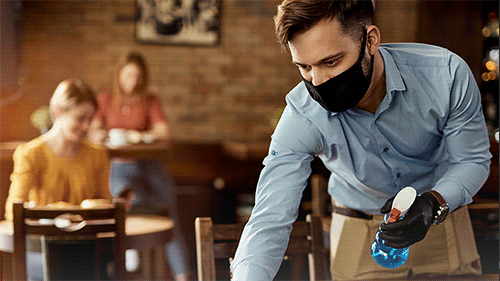Food Hygiene: 7 Hacks for Keeping Customers (and Your Business) Safe
Why food hygiene is more important than ever
Stellar food hygiene protocols have always been non-negotiable for successful hospitality operators. They ensure the ongoing quality of your output, minimise the risk of food-borne illnesses, and make customers feel safe. And if they feel safe, the chances are they’ll visit your venue again. And with COVID-19 still looming large, people want to feel safe more than ever.
For many operators, it means there’s not only the pressure of a successful reopening, but also the added pressure of managing patron safety. On top of implementing practical COVID-19 safety measures, food hygiene plays a key part in this.
Word-of-mouth and online reviews can spread like wildfire – and just one negative customer experience can have a wide-reaching impact. Poor food hygiene can drive away existing patrons and prevent you from attracting new ones, which can be ruinous for a small hospitality business.
You may even be subject to a random food audit and, if you fail, your venue may be forced to close for a prolonged period.
7 food hygiene hacks
- Ensure you have an FSS onsite: Having an FSS on your premises is mandatory for most hospitality businesses, and ensures there’s someone onsite who’s up to date on regulatory changes and best practice.
- Train your staff: It takes a village, especially when running a food business. Getting everyone on board ensures your food hygiene policies are executed properly. This way, everyone knows their responsibilities.
- Make hand washing mandatory: This should be second nature by now, but it’s important to reiterate to your staff to wash their hands thoroughly before and after they come in contact with food – and even between certain food groups (like vegetables and meat, for example).
- Clean your produce: No matter how clean it may appear, make sure to always scrub your produce as part of your prep. While softer vegetables can be washed in a clean sink, firmer ones are best scrubbed with a suitable brush. This helps remove any residue or contaminant build up, such as dirt.
- Sanitise all tools and surfaces: Just as your servers are responsible for sanitising tables between customers, your kitchen or bar staff are responsible for keeping their workstations and tools clean before, during and after food prep. Cutting boards for meat produce and fruit or vegetables should be cleaned after use and not used interchangeably.
- Check in with your suppliers: Contamination can occur long before the produce hits your kitchen bench. That’s why it’s important to work with suppliers you trust. Make sure you know where your food supply comes from and how it’s stored and treated along the way.
- Store inventory safely: This counts for both tools and produce. Things like towels and cutting boards should always be stored dry to prevent bacteria from growing. Food should be stored in separate airtight containers in a suitable, temperature-controlled environment to avoid contamination. Any leftovers should be put into the fridge within two hours.
After COVID-19, food hygiene is more important than ever. By familiarising yourself with new regulations with best practices – and helping everyone understand what their tasks and responsibilities are – you can help set your venue up for success.
5th July 2022
















